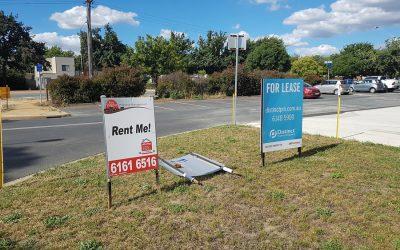
With evictions largely banned in the US, how can landlords protect their rental income?
The short answer: prevention and protection.
Deni and Brian walk through how to avoid the kinds of tenants that will stop paying, and how to protect your rental income streams even after signing a lease agreement, using tools like rent default insurance and reporting rent payments to the credit bureaus.
Video Broadcast Version
Audio Podcast Version
Also available on iTunes, Stitcher, and wherever else you listen 🙂

Deni Supplee: Hi everyone and welcome, we are glad to see you. We were off last week because I was away, actually.
Brian Davis: A little R&R!
Deni Supplee: Yes, a little R&R up in the mountains with the whole family.
Brian Davis: Yeah, the mountains is the happiest place to be right now, is where everyone wants to be. Get out of the civilization, out of the cities.
Deni Supplee: Yes, it was kind of nice, we didn’t do anything because really there was nowhere to go because everything was kinda closed out. But we play games and this stuff all together. It was kind of fun! That’s what happens when you have a big family, you party all the time.
Brian Davis: Deni, does have a big family.
Deni Supplee: And we have another one coming in three weeks.
Brian Davis: Your son and daughter in law right? A boy and a girl.
Deni Supplee: Yeah, i could talk about these all day long but that’s not why we’re here to talk about. Well the CARES Act Round 1 has expired, so the moratorium has kind of ended there are some localities in States that are carrying it further, longer. But with that being sad, as landlords, it’s time that we get some ways to protect our rent. Cause look, this happens out of nowhere and who knows when could happen again. So, if nothing else, let’s learn how to at least protect ourselves during this unforeseen circumstances.
Brian Davis: You know, collecting rents it’s been a challenge for a lot of landlords over the last four months. Partially because the unemployment rate it’s been so high. And you got the CARES Act preventing evictions in a lot of properties so they are stuck with tenants that won’t pay rents. And like you said Deni, in a lot of states and cities defer their own eviction moratoriums. So we are going to talk today about ways that landlords can protect their rental income even during this pandemic that doesn’t seem to be going away. We were talking about it three months ago, we’re still talking about it now, I think we are all hoping that by this time things will ease up a little bit, but here we are. So Deni, let’s talk first about what you can do before even signing a lease for the tenant to ensure that you’re going to get the best possible odds of collecting rents.
Deni Supplee: Well, I mean, the obvious is tenant screening but it is not just tenant screening. I mean so many people do this and there is so much advice out there saying don’t just do it, but is done anyway. But tenant screening is more than just credit, criminal, and, eviction reports. All though they are important, pay attention! You’re going to get a lot of stories, somebody is going to tell that in 2000-whatever they did this and that happened. But be Carefull! Cause you wanna make sure you’re going to get your rent and that’s the name of the game, so you need to be very precise when you’re looking at it and be very choosy the other thing is you wanna contact employers, don’t just go with what they are writing down. Contact the employers, see if you can talk to somebody in HR, find out how long that person has been there, if you are renting o somebody that hasn’t been in that particular job for too long, find out were they worked before, contact the prior employers, and make sure it’s kind of the same field so you don’t see a job hoping kind of path going on here.
Brian Davis: And you wanna verify their income as well, and ensure that it’s lined with what they report in their rental application. So, someone can say on their rental application they make 10 thousand dollars a month but if their paychecks are saying that they made 10 thousand dollars a month, then there is a missing 5 thousand dollars there and you got to figure out where that’s coming from, if it exists at all.
Deni Supplee: And if there’s going to be a lie somewhere, you don’t want it to be there, and you don’t want to be anywhere. So if you’re starting to see something that’s not lining up, then don’t take the chance. Cause you will have a problem later. Everyone says just ”No, this one just went through a hard time and there are people that has that, but they’ll be honest.
Brian Davis: Absolutely, and when you talk to an applicants employer see if you can talk to their direct supervisor as well and ask what kind of worker are they, how conscientious are they, do they show up at time everyday for work, or are they they a pleasure to work with, are they trustworthy, are they reliable and the supervisor are not legally obligated to answer this questions for you. But many time they will, so it makes a good character reference for how reliable and conscientious the renter is.
Deni Supplee: And then of course, you wanna contact the current prior landlords i would as far as driven by their current residence, that gonna let you know how well they take care of a property for a little clues when they come to see your place, look at their cars. That’s like a number one! If you see somebody that doesn’t take very well care of their care then probably they’re not going to take care of your rental. So be careful with that! And the biggest is see how their children behave, i have shown a house and the kinds were like running all over the place and touching thing, there were no supervision at all and i guarantee you that the same parents are going to be on your rental and you’re going to have complaints from you neighbours (if you have them) or they’re gonna be ripping stuff of walls or whatever, so be careful to see how the parents are dealing with the children while they’re running around looking at the place too, and what about you, Brian? Do you have any additional tips?
Brian Davis: Yeah, you test by going by their homes to take a look at it. I just wanna expand on that point a little bit. that’s a great opportunity for you to go visit them or their home (and this should be the last thing you do by the way), if everything else checks out. Because this should take some of your time, you go out of your way to visit their home, but find an excuse to meet them at their home, maybe it’s just a walk through the lease agreement. But take a look on how they treat their current home, because that’s how they’re going to treat your property. If it’s a total mess, if there is dirty food all over the kitchen and the living room, if they have clothes strewn everywhere and toys and is just dirty and messy. That’s what they are going to do to your property. So you can see a perfect crystal ball of what exactly they are going to do to your house.
Deni Supplee: And the only other thing that just choked me is that with that type of issues, with this pandemic that just came up, obviously not every renter is going to have a great savings account, but it isn’t bad to find ‘out and ask for bank statement to have proof that they do have money saved up, so that if god forbids something like this happens (so, it is happening) they are going to have backup. So you’re not gonna hear “Sorry, I have no rent.”
Brian Davis: Financially stable people have an emergency fund of a least one month worth of expenses, preferably 2, 3, 4 even 6. That’s just a fact! Financially stable people have an emergency, and if they don’t have an emergency fund, that’s a red flag. That they are not very financially secure. So we did include a link where you can run tenants screening reports for applicants, credit reports, criminal reports, and nationwide eviction reports. So we listed that in the comments. Deni, anything else you wanna touch on when it comes to tenant screening and avoiding unstable renters?
Deni Supplee: Just pretty much what you said and hold on to the rental applications because they include a lot of information you can use for collection later on.
Brian Davis: Moving on to tenant screening, one of the other thing you can do for your incentivize your tenants to pay their rent on time once they have already moved in is you can obviously charge lay fees, but beyond lay fees you should also report their rent payment to the credit bureaus as if one other layer of incentive for them to pay their rent on time, so you rewards them for paying the rent on time and penalizes them for paying the rent late or if it has to be evicted or charged of. All that is reported to the credit bureaus and hurts their credit. So both a career and a stick to incentivize your tenants.
Deni Supplee: And for tenants that are looking to eventually buy a home, that’s even more of a plus. They’ll leave you eventually but at least you know they will pay their rent while they’re with you.
Brian Davis: Yeah, i actually found that when your screening tenants, try to see how they react when you offer to report their rent payment checks to credit bureaus because reliable people will be excited about that, like ”Great, that’s a chance to improve my credit”, unreliable people will freak out about that. So, how they react when you tell them you’ll be reporting their rent payment to the credit bureaus, if they react positively they pay the bills on time and they are taking the opportunity to improve their credit even more. Someone how does not always pay their bills on time will get a little nervous about that.
Brian Davis: Terrence is mentioning that we finish each other’s sentences. Are we working together for like, 12 years now? It’s been a long time.
Deni Supplee: Has it been that long?
Brian Davis: It has been that long, since 2008. So, as for the way you can report your rent payments to the credit bureaus, it’s something that we will be offering, we are going to be launching on online rent collection service over the next month or two, hopefully. And we’ll be adding it as a feature that’s free for landlords reporting their rent payment for the credit bureaus.
Deni Supplee: So, let’s talk about rent default insurance. That’s a lot of polar opposite feelings about this. So, just going through a little bit on what it is, cause a lot of people don’t know.
Brian Davis: Sure, so rent default insurance is exactly what it sounds like, you are taking up a insurance policy, they guarantee that the tenants will pay their rent, and if the tenants default on their rent, then you file a claim with the insurance company and the insurance company and the insurance company pays the rent on their behalf until you have them evicted. So you don’t suffer any loss in rental income.
Deni Supplee: Even during the pandemic?
Brian Davis: Yeah, so you insure your rental income, basically. You’re insured against losses, which is great. I have used rent default insurance before and have to tell you Deni, the people that don’t understand why anyone would buy rent default insurance. They are landlords that never had tenants to fault on them. So, basically they got themselves lucky. Because as someone how has had many tenants to fault on them, yi have some lower rent with rent defauts with those neighborhoods, i got to tell you it is such a load of your shoulders when you know that even if the tenants doesn’t pay their rent, you’ll get your rent check, no matter what.
Deni Supplee: And there is, you know people that say ”were screening and are gonna report rent payments, so why do we need this?” But this is also protection for good tenants that have bad things happen, like health issues. Because let’s face it, that could happen!
Deni Supplee: So, is an extra layer of protection.
Brian Davis: So, Cristine asked if it is expansive rent default insurance. Is not expensive, typically costing between 350 and 500 dollars a year. The amount of the annual premium depends on the amount of the rent, so the higher the rent, the higher the premium. As one might expect. So, Cristina, we added a link in the comments where you can go and get a quote for rental for insurance and check it out! She also asked about requirements ”Do they ask for documents?” So, they ask for a copy of the lessee agreement, they ask for a copy of the tenant screening reports and a copy of the rental application, i believe. She says thanks, Deni. I can’t speak highly enough about it, it is worth every penny and if nothing else, you get to go to sleep at night knowing that you’re going to get your rent come hell or high water.
Deni Supplee: And frankly if you’re evaluating your property and you’re evaluating the costs, bake it into your rental cash flow numbers.
Brian Davis: Yeah, so build it in through your cash flow analysis when you’re looking at properties, you just build it in as an expense when you’re running the numbers in a rental cash flow calculator, which we’ll link to here. Deni, is there anything else that landlords need to know about protecting their rental income, especially during tumultuous times like these?
Deni Supplee: Well, I just think. Using a good, strong, landlord protective lease that speaks out everything, so the landlord knows what and where they can go. Even with an eviction moratorium that just means the eviction itself is on hold but that doesn’t mean the proceedior is missing things that you have to do until that point is on hold. And if you have a good lesse that spells that out, you follow those protocols, you actually protect yourself. And when these things are lifted you’re ready to go.
Brian Davis: There’s a lot of things about underestimating a very protective lease agreement. A protective lease agreement for landlords can mean the difference between being able to dutch from the security deposit, it can be the difference between being a lord collector from each of the tenants individually minor a million clauses that good landlord protective lease agreements include. And, of course, we offer those on our website, but we’re not the only people that sell landlord protective lease agreements. We have a question here from Denisa: ”What about if i didn’t do the credit report to the tenants, will i still be able to get insurance?”
Deni Supplee: I’m assuming you mean there are tenants in place and you want a new policy after you already accepted them? I think they’ll take them on a case by case basis, i would go ahead and go to the link and let them know all that. There’s different scenarios and enters for each, but furthermore they’re gonna wanna see some type of credit.
Brian Davis: And it’s never too late to run these background checks on tenants, even if they already moved in. So that’s possible as well. If you’re interested in getting rental default insurance and if you talk to them and they do require these background checks, than you can just run them now.
Deni Supplee: Absolutely.
Brian Davis: Deni, anything you wanna comment on, before we wrap this up?
Deni Supplee: Just one thing. I know we talk a lot about protecting ourselves about tenants, most tenants are pretty good, and I’ve seen a lot of goodness come out of these pandemic. I’ve seen landlords going out of their way to help tenants and I’ve seen tenants genuinely try to do what they can, even if they’re in a bad situation. So, we have this landlord group of 30,000 and sometimes we hear horrific stories, but there also are a ton of amazing stories as well, just good humanity. That’s it.
Brian Davis: Is good to remember. It’s all too easy to fall into that landlord – tenant trap of thinking this relationship is being combative but when done right, this should not be a combative relationship, it should be a cooperative relationship between a service provider and a client. On that note, let us know what you guys want us to talk about next week. This is more about you guys, then it is about us. So send us a message on Facebook, send emails through our website, email me and Deni. Let us know what you wanna hear more about. We’ll see you next Thursday at 2 o’clock. Have a great week!























